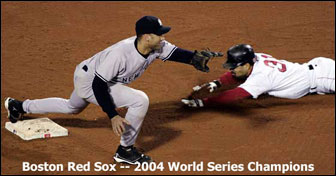Dogs Pound
![]()
Dogs Pound
The proprietor of my favorite breakfast haunt, “Ernie’s” in Melrose reminds me that the customers don’t open to the paper to read about filibusters, war, or pressing social issues, they read the gossip column and sports.
Media Envy. A natural tension exists between broadcast media and print media, which now includes mainstream journalism, web destinations (www.bostondirtdogs.com being a flourishing one), and the cottage industry of blogging. Needless to say, no MCAS or SAT standards restrain any of the above. Once upon a time, “real” journalists skewered Rotisserie players (wannabes) and continue to lambaste the ‘Internet geeks’, as though they own the “sports thought” franchise. WEEI, as sports ‘think tank’ as it were.
Both sets of media educate, inform, and entertain their audiences. We also have to ask where to draw the line among news reporting, rumor, innuendo, and character assassination. This week, one of the more outspoken WEEI commentators replied that if he were going to get inside information, he’d go to ESPN Insider, not Dirt Dogs, the implication being that most Internet sites have neither scoops nor reliable data. Peter Gammons defended the site; he correctly reported that overseer Steve Silva has numerous sources both within and outside the sports world. Time has proven Mr. Silva right on numerous occasions, from the extent of player injuries to obscure signings from Japan.
You want economy; you have to pay for it. Athletes, like other celebrities, sacrifice elements of privacy in exchange for the oversized salaries they earn. Some perform better for the media than they do on the field, which can enhance their popularity, prolong their careers, and even lead to broadcasting careers (e.g. Steve Lyons).
“Baseball isn’t a matter of life or death, it’s a lot more important than that.” Monster seats don’t go for $999 on eBay because of a lack of interest. Yogi Berra was right, “that place is so busy that nobody goes there anymore.” When people care enough to spend weeks’ salary on entertainment, they care about players’ health, players' weight, Wonderlic scores, and whether they get enough rest. The average shoeshine boy in Boston knows about rotator cuff and labrum tears, and the fragility of the ulnar collateral ligament. When people talk about mechanics around here, it’s as likely to be about arm slot or throwing across their body as about auto repairs. So if Dirt Dogs reports that Keith Foulke may have visited Dr. James Andrews’ shop in Alabama, fans want to know if he’s hurting. Do they have a right to know? I’m not sure, but Mr. Foulke clearly understands that he’s not ‘just plain folk’ around here. He’s sports royalty and his subjects ‘need to know’.
Internet paparazzi? Unwritten rules do protect the athletes from themselves, too. The national focus on performance-enhancing drugs abrogates that limit, but many others exist. You don’t hear or read about athletes’ philandering or sometimes overindulgence in the ‘worship of Bacchus’, because it’s simply off-limits. By the time we know a problem exists, you can be sure the players’ families, front office, teammates, clubhouse attendants, parking lot guys, and peanut vendors know it.
It happens. Publicizing players’ ethical challenges doesn’t serve anybody’s benefit, and are ordinarily handled in house. A former Patriot player told me that Ray Berry was a fantastic coach because of his skill in handling not only football responsibilities but also off-field issues, ironic considering the scandal erupting after Super Bowl XX. Sometimes a player gets a positive reputation for being a standup guy in dealing with the media (e.g. Jim Rice’s accountability when negative performance affected the outcome of a game) or by virtue of being a solid citizen away from home. Roger Clemens, whatever your take, always carried a reputation as being the straightest arrow in the quiver.
Humbling profession. I’m not talking about baseball. “What’s the difference between God and surgeons? God doesn’t think he’s a surgeon.” The most successful doctors thrive off the triad and truism of accessibility, affability, and ability. Doctor Bert Zarins has maintained a good reputation with the Patriots in the background. Dr. Bill Morgan’s medical stewardship of the Sox ran aground. Physicians aren’t any different than anybody else with respect to personal lives and frailty. I don’t know if there have been any physician saints since Cosmas and Damian. How Dr. Thomas Gill’s tenure goes with the Red Sox may not necessarily depend on his skill, but his luck, too. Medicine isn’t nearly as exact a science as people want to believe, and ‘House’ is as typical a doctor as John Rocker was a typical relief pitcher.
Turf wars. A turf war for ‘eyes’ reigns just as much in the media world as it does in the sports world. Sports radio has a loyal and demanding audience, and mostly gives the fans what they want. We’re fortunate not only to have fascinating teams to follow but passionate sports journalism in Boston, too. Attempts to lessen the credibility of print media, even ‘Internet geeks’ diminishes only the critics. As my son reminded me when he was in high school, “it’s OK, Dad, geeks rule the world.” Just ask John Henry; I’m sure he’d agree.
-- Ron Sen, Boston Dirt Dogs contributor (Check out Ron's blog, Red Sox Reality Check)







